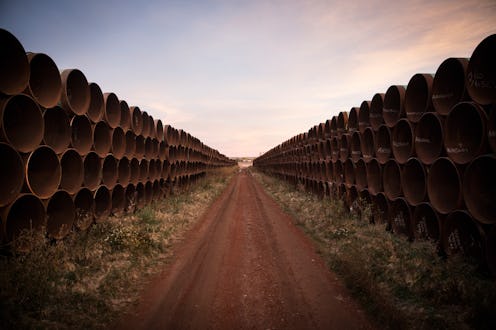With the upcoming presidential election in 2016, recent updates on the Keystone XL Pipeline are stoking the fire in the debate over climate change. The Associated Press reported Monday that President Barack Obama obliged TransCanada’s request to push back the pipeline’s review so that the company can have more time to solidify their preferred route through Nebraska. As usual, outlooks on the pipeline follow predictable party lines, but effective implementation of environmental laws will require a bipartisan solution.
Over six years have passed since North American energy company TransCanada proposed the Keystone XL Pipeline, which would connect Alberta, Canada to Steele City, Nebraska. The pipeline and its effect on the environment is likely to be one of many climate issues the new president will have to face head on upon taking office.
According to NPR, seven of 15 Republican candidates have supported taking action against global warming, but only two explicitly stated they will make moves to combat climate change if elected. Conversely, each of the Democratic candidates are willing to sacrifice business interests and take into account the future of the environment. For example, Bernie Sanders proposed a tax on carbon emissions and a discontinuation of tax breaks for oil companies. Upon receiving an endorsement from the environmental group Friends of the Earth Action, Sanders shared his stance at a New Hampshire news conference on Aug. 1:
We need to transform our energy system away from fossil fuel and into sustainable energy ... If you’re concerned about climate change, say no to the Keystone XL pipeline.
Lesser-known Republican candidates Lindsey Graham and Bobby Jindal, neither of whom were present in last week’s debates, have put more emphasis on the environment than spotlight opponents like Donald Trump, Jeb Bush, and Ben Carson — but there's a catch. In reality, the two candidates are simply playing both party cards simultaneously. For example, Jindal’s energy policy proposal promotes the simultaneous development of fracking and renewable energy resources. Clearly keeping business interests in mind, he writes that the EPA has "sacrificed economic growth at the altar of fealty to a radical environmental agenda."
Carson has denied that climate change is man-made, yet his stance on energy policy is not unrelated to that of Jindal. In his 2014 Washington Times opinion piece on environmental regulations and world peace, Carson blames global warming on “a coming ice age, which was predicted in the 1970s." Coincidentally, the article features a “Pipelines Work!” ad.
Many advocates of common sense are also very concerned about the environment but are reasonable enough to realize that rather than using Environmental Protection Agency regulations to stifle abundant energy production, we can use the EPA in conjunction with the spirit of innovation and entrepreneurship to produce and export a vast amount of clean energy.
Carson’s statements suggest that even someone who doesn't believe in climate change is willing to compromise. Although the Republican candidates collectively cater to commercial interests, they don't starkly oppose clean energy — whether they believe climate change is man-made or not. Even so, they have made their point clear: Business interests are going to be a factor. According to a 2014 Pew Research survey, 56 percent of Americans believe “stricter environmental laws and regulations are worth the cost,” but baby steps may be the only solution.
The New York Times’ Gregg Easterbrook points out that in order to update America’s environmental laws — which do curiously little to reduce greenhouse gas emissions — a bipartisan solution must be reached. Easterbrook describes the “compromise the political world has missed” of Democrats supporting the pipeline so that Republicans support the EPA's carbon emissions plan.
Republicans risk losing their constituency if they make moves that hurt commercial interests. Unfortunately for the environment, it doesn’t look like this will change anytime soon. Whether Democratic candidates find it ideal or not, using the Keystone pipeline as a bargaining chip may represent the lesser of two evils, and it’s another option to be considered.
